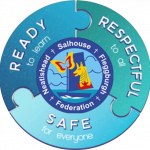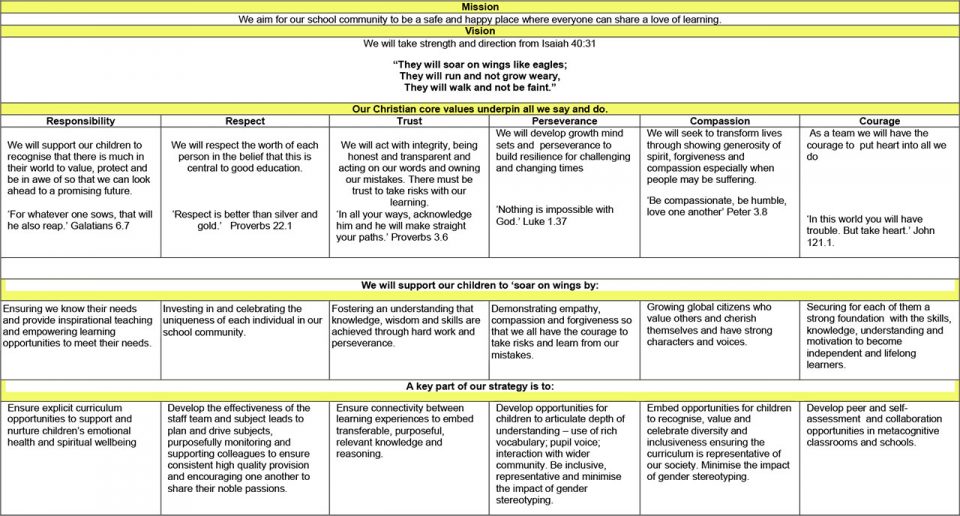Proverbs 22.6
Train a child on the way they should go
and when they are old, they shall not
depart from it.
If you require any other information about the curriculum and learning that takes place in our school, please do contact school and we can arrange for paper copies to be made available.
Curriculum Implementation
Our curriculum consists of planned and unplanned experiences in school and out: lessons, themed days, school council, Collective Worship, clubs, sports, outdoor learning, trips and visits, workshops, residential trips, fund raising, community work, performances and high levels of integration across the age range.
Outcomes are designed to meet the requirements of the Early Years Foundation Stage Curriculum and the National Curriculum and also to develop the skills needed for learning and for life.
Our engaging curriculum is designed collaboratively. Subject specific skills are scaffolded within a cross-curricular theme each term. In order to ensure that progression and balance is maintained, the programmes of study are then developed into medium term plans which clearly highlight the learning objectives, lines of inquiry, assessment opportunities, differentiated tasks as well as links to other subjects. Teachers translate these plans into smaller units: half term, weekly and daily plans where the specific needs of the learners are addressed with reference to the progression plans for each subject to ensure gaps in learning are minimised and children feel confident and ready for the next stages of their learning.
Each class teacher shares termly curriculum plans to provide parents/carers with information about the learning ahead with ideas for extending children’s learning at home and sharing opportunities for parents to be involved at school.
We understand children must feel motivated to engage with their learning. For that reason, our curriculum is child-centred. Children will be motivated when they are feeling emotionally and physically well. Teachers and parents work closely with pupil and family support systems to lift barriers to learning. Building strong relationships is key to fully accessing the curriculum.
Teachers support the acquisition of a rich language through using subject specific vocabulary and high quality text. Teachers know that allowing children to lead the learning will have appositive impact on outcomes. Pupils are supported to lead their own learning through developing metacognitive classrooms, self and peer assessment, leadership roles and by having a strong pupil voice which is listened to.
The curriculum is reinforced by the school’s Christian Core Values. These are taught on their own and through all areas of the curriculum, including Collective Worship. The spiritual, moral, social and cultural development of our pupils and their understanding of British Values are woven through the curriculum.
The school environment is used creatively to support learning. Teachers, support staff and pupils identify the need for resources to support teaching and learning.
Staff are supported to share best practice within school and across the federation and cluster.
Curriculum Impact
Pupil achievement is assessed using progression and attainment data, recognising that good outcomes are not just measured in ‘qualifications’ but in how successfully pupils are developed as well-rounded citizens. Teachers are able to define what good progress means for individual children and groups and the ability to do this well comes from a strong knowledge of children as individuals. Pupils are encouraged to revisit and practise skills, apply knowledge and understanding. Pupils are prepared for the next stage in their education and face new challenges with resilience. The enthusiasm children have for their learning is demonstrated in how they talk about their learning and make links within and between subjects, how they share their learning and progress interests from home linking them to their learning at school. The pride they show in their learning can be seen in their exercise books and on displays. We want each child to be able to enjoy a passion for an area of learning they particularly excel at or enjoy. Our success is measured by what our children become. They become resilient, inquisitive, reflective, aspirational, confident , compassionate, courageous, proactive, informed, engaged, creative , spirited, articulate, generous , self-sufficient, spiritual, respectful, reliable, honest, knowledgeable, skilful, interesting and interested, supportive, independent, ambitious and of strong character. They will feel safe and happy and able to share a love of learning. They will ‘soar on wings.’
Curriculum Overview
‘Soar on Wings’
Pupils are currently taught in two mixed age classes. YR/1/2 and Years 3/4/5/6
In KS2 (Years 3-6) The National Curriculum is covered through a four year rolling programme of cross-curricular themes.
| Autumn 1 | Autumn 2 | Spring 1 | Spring 2 | Summer 1 | Summer 2 | |
| Year A | The Stone Age | Maps | The Egyptians | Water and Rivers | The Norfolk Broads | |
| Year B | The Romans
(UK and Italy) |
The Circus | World War II | Pirates | The Olympics | |
| Year C | Endangered Animals | The Anglo-Saxons | Chocolate! | Travel and Transport | Kings and Queens | The Seaside |
| Year D | The Vikings | Mountains, Volcanoes and Earthquakes | China | Art | Knights and Castles | Our Village |
In KS1 (Years 1 and 2) The National Curriculum is covered through a two year rolling programme of cross-curricular themes within a four year rolling programme. With several of the themes being parallel to KS2, the school enjoys sharing learning across the age and stage range.
| Autumn 1 | Autumn 2 | Spring 1 | Spring 2 | Summer 1 | Summer 2 | |
| Year A | The Stone Age | Maps | Transport | Weather | The Norfolk Broads | The Norfolk Broads |
| Year B | The Fire of London | The Circus | World War II | World War II | Pirates | Great Explorers |
| Year C | Endangered Animals | Guy Fawkes | Weather | Travel and Transport | Kings and Queens | The Seaside |
| Year D | Great Explorers | Oceans and Continents | China | Art | Knights and Castles | Our Village |
In Reception, children follow the EYFS curriculum. They enjoy a mix of adult and child led activities which relate to the KS1 themes. Children in YR-Y2 enjoy Forest School sessions learning alongside the Little Explorers Nursery.
When planning each cross curricular theme, the following aspects are included:
| Opportunities for knowledge acquisition linked to the theme and drawing upon previous themes and the children’s general knowledge all of which inspires further learning. | Opportunities to learn, develop and apply skills in line with progression matrix | Opportunities to link into literature and high quality text that link to and enrich the theme. |
| Opportunities to explore own views through big questions. What is this to do with me? |
Theme Title Rationale for Theme |
Opportunities to learn about key people who have/are shaped/shaping our world ensuring diverse representation. |
| Opportunities to explore British and Christian Core values. | Opportunities to learn how the theme has inspired the Arts /culture across the world. | Opportunities to learn about key events linked to the theme that have shaped/are shaping our world |
Pupils have opportunities built in to revisit previously acquired skills and knowledge and then apply them to new contexts. They read and write for a variety of purposes across the curriculum.
The pedagogical approach is mainly traditional with a teacher centered pedagogy. A successful element of school improvement is in creating more opportunities to allow learners to develop stronger independence with their learning in increasingly metacognitive learning environments.
Teaching provides a balance of both skills and knowledge acquisition. Whole class, rote, modelling and demonstration are blended with enquiry based learning, individual and group work and a thematic approach to the delivery of the curriculum. This mix reflects the skill of the teacher to identify and meet the individual learning needs of the children. A wide range of resources are used to support the learning needs of all the children. The children have easy access to the library, ICT and a school ‘Knowledge Bank’.
Hands on experiences together with using the wider community to enrich the curriculum leads to an engaging and relevant curriculum. Pupils are supported to access high quality literature in all subject areas.
Currently subjects are taught as discrete subjects linked to the overall theme. Pupils are supported to identify the links between and within subject areas.
The school’s progression matrices in each subject area inform planning and subjects are presented clearly and in sequence to support the acquisition of knowledge and skills and the deepening of understanding. Subject specific vocabulary is introduced gradually, it is revisited and the expectation is that teachers and learners will use it consistently and confidently.
Pupils are given time to reflect on their learning, test their knowledge and celebrate their achievements.
Teachers are skillful at identifying gaps in learning. Interventions are in place and the assess, plan, do, review cycle is used to support pupils to close those gaps, make stronger progress and enjoy full access to the curriculum.
The school's Christian core values and vision underpin the teaching and learning of the curriculum.
Year A Medium Term Plan Art Emerald
Year A Medium Term Plan DT Emerald
Year A Medium Term Plan English Emerald
Year A Medium Term Plan Geography Emerald
Year A Medium Term Plan History Emerald
Year B Medium Term Plan Art Emerald
Year B Medium Term Plan DT Emerald
Year B Medium Term Plan English Emerald
Year B Medium Term Plan Geography Emerald
Year B Medium Term Plan History Emerald
Year C Medium Term Plan Art Emerald
Year C Medium Term Plan DT Emerald
Year C Medium Term Plan English Emerald
Year C Medium Term Plan Geography Emerald
Year C Medium Term Plan History Emerald
Year D Medium Term Plan Art Emerald
Year D Medium Term Plan DT Emerald
Year D Medium Term Plan English Emerald
Year D Medium Term Plan Geography Emerald



